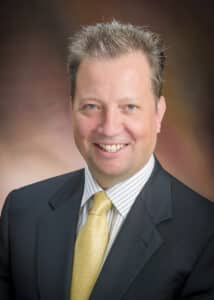Congratulations to the 2024 Outstanding Contributions in Research Award Recipient

The ASNR awards Timothy P.L. Roberts, PhD, with the 2024 Outstanding Contributions in Research Award.
Timothy P.L. Roberts, PhD is Professor of Radiology at the University of Pennsylvania/ Children’s Hospital of Philadelphia. Dr. Roberts is vice-chair of research in the Department of Radiology at The Children’s Hospital of Philadelphia and directs the Lurie Family Foundations’ MEG Imaging Center. He also holds the Oberkircher Family Chair in Pediatric Radiology at CHOP. He has 35 years’ experience in medical imaging and has published in excess of 300 manuscripts primarily in the area of physiological and functional imaging. He has 30 years accumulated expertise in magnetoencephalography (MEG), and has published over 120 MEG articles, primarily on auditory processes in control and patient populations, especially ASD.
Dr. Roberts obtained his PhD in MRI physics from Cambridge University, England in 1992 (BA, MA, Cambridge University, 1988). He subsequently undertook a postdoctoral fellowship in Neuroradiology at the University of California, San Francisco (UCSF) and has been on the faculty at UCSF (Radiology, 1994-2002, Asst. & Assoc. Prof) and the University of Toronto (Medical Imaging, 2002-2005, Assoc. and Full Prof) and is presently holder of the Oberkircher Family Chair in Pediatric Radiology and Vice-Chair for Research in the Department of Radiology at Children’s Hospital of Philadelphia as well as tenured Professor of Radiology and Adjunct Professor of Linguistics, University of Pennsylvania.
He directs the Program in Advanced Imaging Research (PAIR) and the Lurie Family Foundations MEG Imaging Center at CHOP (one of the larger clinical and research MEG facilities in the USA, with 4 MEG devices (including novel infant and wearable devices), 2 research-dedicated 3T MRIs, a high-density EEG/ERP lab and a staff of approximately 30-40 faculty, postdocs, graduate students, research assistants and technologists). His research focuses on developing multimodal, 4D/5D functional imaging using biomagnetic recording (magnetoencephalography, MEG) as well as advanced MRI techniques (such as diffusion tensor imaging and edited magnetic resonance spectroscopy), specifically in the study of auditory processing and language impairment in autism spectrum disorder (ASD). His pursuit of imaging/electrophysiological biomarkers has been supported by the National Alliance for Autism Research, Autism Speaks, the Nancy Lurie Marks Family Foundation, the Commonwealth of Pennsylvania, the Simons Foundation, Clinical Research Associates, the Dept. of Defense and through multiple awards from the National Institutes of Health (NIH). He currently holds 2 active R01 grant awards as PI, as well as serving as PI of the Signature Research Project and the Neuroimaging and Neurocircuitry Core for the NIH P50-funded CHOP Intellectual and Developmental Disabilities Research Center (IDDRC). He additionally serves/has served as the primary mentor of 6 junior faculty supported by NIH “K”-awards and has active research endeavors, beyond the field of autism and related genetic syndromes, in Huntington’s disease, Friedreich’s Ataxia, mild traumatic brain injury (mTBI) and infant sequelae of in utero opioid exposure, as well as methodological development. He has published in excess of 300 peer-reviewed scientific papers, with an h-index of 86 and more than 24000 citations, 30+ book chapters, 3 books and has given a large number of international invited presentations, mostly in the field of physiologic and functional imaging and holds 7 patents relating to imaging and MEG technological development and application.
He is an Associate Editor for the Frontiers in Integrative Neuroscience journal. He regularly reviews grant proposals for NIH (standing member, DBD 2008-12) and several equivalent international agencies (UK, Germany, Austria, Singapore, Israel, Cyprus, Canada, Holland, United Arab Emirates), and has served on the executive committee of the American Society for Neuroradiology, the American Society for Functional Neuroradiology (President 2009-10) and the International Society for the Advancement of Clinical MEG (President 2009-11).
In 2018 he chaired the host committee for the International Meeting on Biomagnetism (Biomag ‘18), the premier meeting in its field. In 2016 he was elected as a “Distinguished Investigator” of the Academy of Radiology Research and in 2019 he was elected as an inaugural Fellow of the American Society for Functional Neuroradiology. In the last two years he has given invited presentations on emerging imaging technologies (focused on optically-pumped magnetometers, OPMs) at the Radiological Society of North America (RSNA) and the American Society for Functional Neuroradiology (ASFNR). In 2022, he received the Norman E Leeds award for best scientific contribution at the Eastern Neuroradiology Society (ENRS) and in 2023 gave plenary/keynote presentations at the European Society for Pediatric Radiology and the International Society for the Advancement of Clinical MEG.